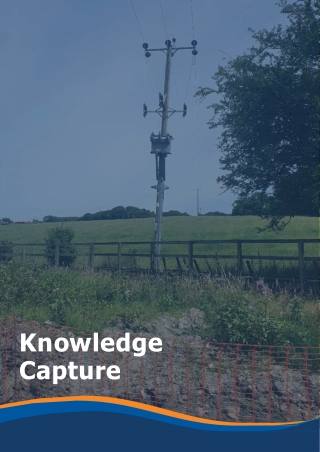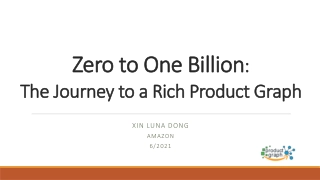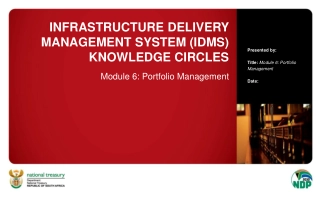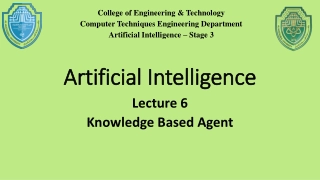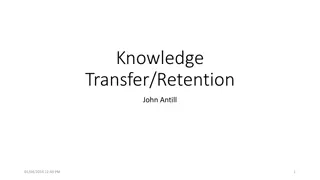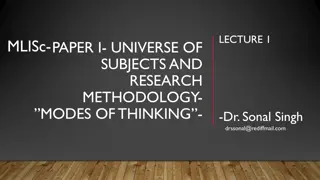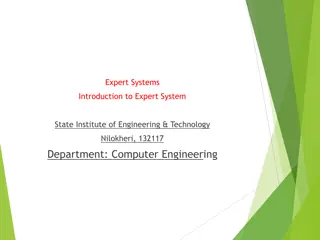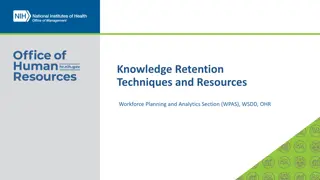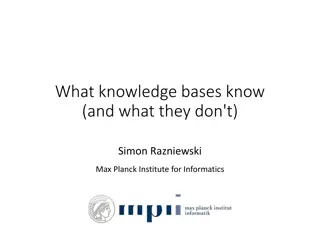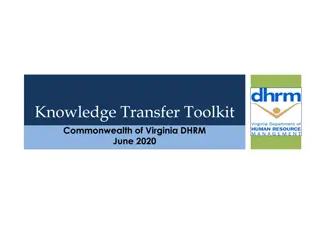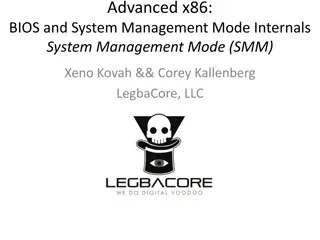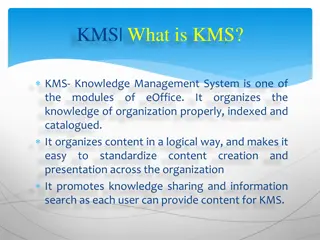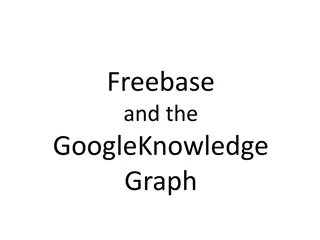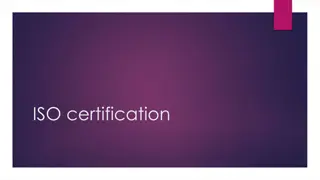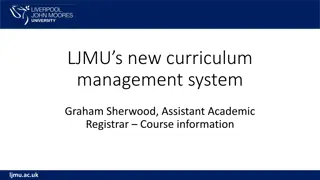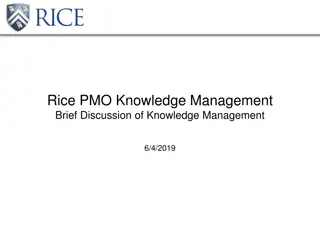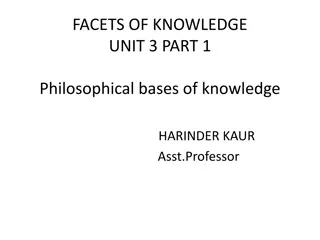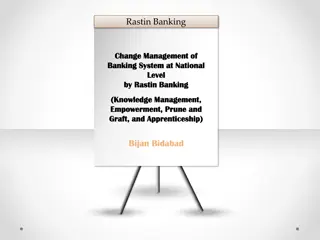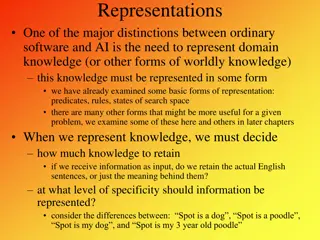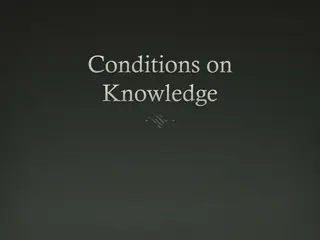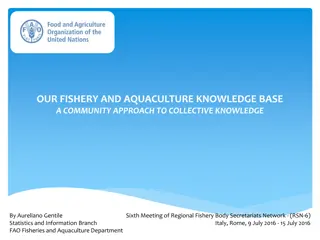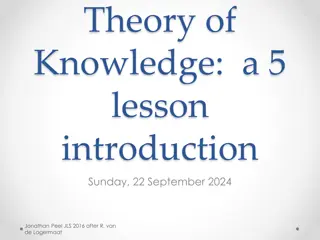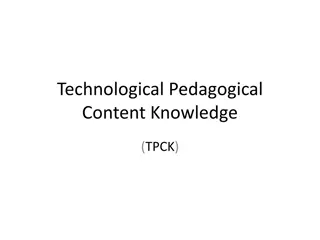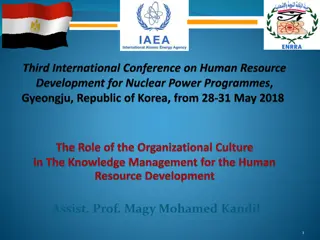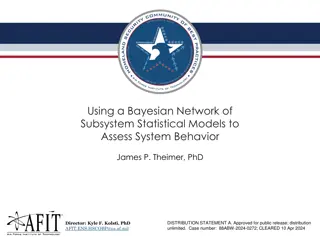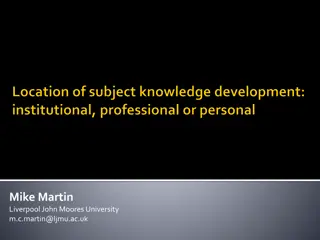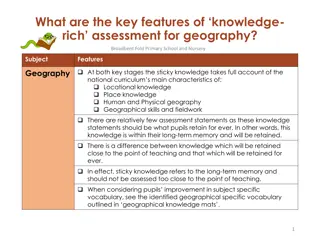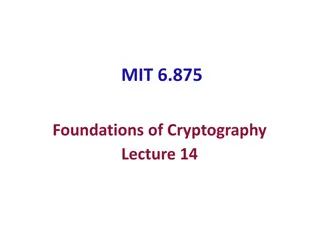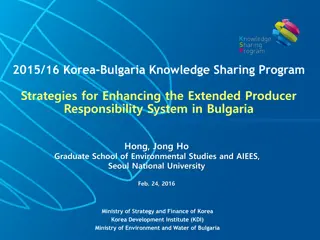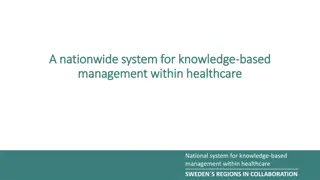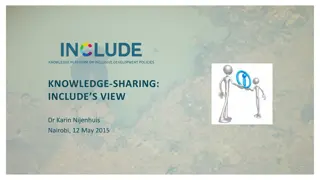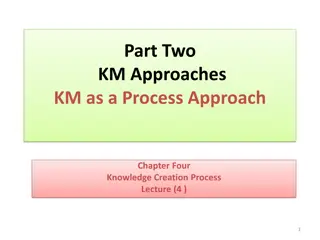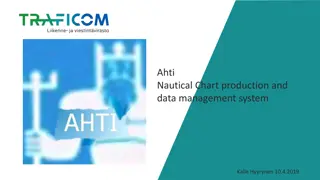Knowledge Capture
Knowledge capture is crucial for organizations to retain valuable expertise and prevent loss of critical knowledge due to employee turnover. Tacit and explicit knowledge play key roles, requiring strategic planning for retention, incentivizing knowledge-sharing culture, and implementing effective st
0 views • 6 slides
Exploring Product and Knowledge Graphs for Enhanced Information Retrieval
Dive into the world of product and knowledge graphs, uncovering the journey to a rich product graph, examples of knowledge graphs for songs, and the mission to provide comprehensive information on products and related knowledge. Discover use cases ranging from information provision to enhancing sear
3 views • 76 slides
Infrastructure Delivery Management System (IDMS) Knowledge Circles Module 6: Portfolio Management
This module delves into the concept of Infrastructure Delivery Management (IDM) within the context of South African organs of state. It outlines the processes and procedures necessary for implementing IDM, focusing on portfolio management as the initial step in a series of four delivery management m
3 views • 36 slides
Understanding Knowledge-Based Agents in Artificial Intelligence
Knowledge-Based Agents in AI utilize logic and knowledge representation to accept tasks, learn, and adapt to changing environments. Logic plays a crucial role in forming complex world representations and deriving actions based on inference. The central component is the Knowledge Base (KB), represent
4 views • 19 slides
adonai software
Adonai college Management System is a cloud-based ERP System that delivers various College and School Management Systems, College and School Management Software, College and School Management System ERP, College and School Management Software System, Online College and School Management Software Sys
3 views • 1 slides
Understanding Knowledge Management: Processes and Frameworks 2. In knowledge management, organizations create, share, and manage knowledge to enhance performance. It involves acquiring different types of knowledge through various means, such as perc
Knowledge Management, Organizational Objectives, Types of Knowledge, Tacit Knowledge, Explicit Knowledge
1 views • 17 slides
System Models in Software Engineering: A Comprehensive Overview
System models play a crucial role in software engineering, aiding in understanding system functionality and communicating with customers. They include context models, behavioural models, data models, object models, and more, each offering unique perspectives on the system. Different types of system
3 views • 33 slides
Pedagogical Shift in Physical Science: Constructing Knowledge Through Learner-Centered Experiences
There is a significant pedagogical shift in physical science education from viewing science as a fixed body of knowledge to emphasizing the process of constructing knowledge. Learners are now placed at the center stage, engaging in inquiry-based learning, critical thinking, and collaborative interac
3 views • 21 slides
Importance of Knowledge Retention in Organizations
Organizations face negative impacts on performance due to the loss of knowledge. Strategies such as exit interviews, mentorship, and knowledge sharing tools are vital for effective knowledge retention. Assessing knowledge retention maturity through various techniques is crucial, aligning with ISO st
0 views • 11 slides
Understanding Modes of Thinking and Knowledge Development
Man's acquisition of knowledge is intricately linked to his ability to think, reason, and perceive. Knowledge is a result of experiences gained through perception, intellect, and intuition. The history of humanity is a story of knowledge acquisition and development, with man at the forefront as the
1 views • 18 slides
Understanding Expert Systems in Computer Engineering
Expert systems are interactive computer-based decision tools that utilize facts and heuristics to solve various problems based on knowledge acquired from experts. This system consists of three main components: User Interface, Inference Engine, and Knowledge Base. The User Interface facilitates commu
4 views • 29 slides
Effective Knowledge Retention Strategies in Workforce Planning and Analytics
Retaining knowledge is crucial for organizations to enhance customer service, foster innovation, improve efficiency, and bridge skill gaps. This article explores the significance of knowledge retention, the types of knowledge essential for succession planning, and two effective strategies - the Know
1 views • 10 slides
Exploring Knowledge Base Construction and Commonsense Knowledge in Fiction
Delve into innovative research interests focusing on knowledge base construction using fictional texts as archetypes, taxonomies for constructing knowledge bases, and extraction of commonsense knowledge from diverse sources. Challenges such as sparsity and semantics are addressed through comprehensi
3 views • 48 slides
Knowledge Transfer Toolkit for Organizational Success
This toolkit, developed by the Commonwealth of Virginia DHRM in June 2020, covers the essentials of knowledge transfer, including its definition, impact, challenges, and management strategies. It emphasizes aligning knowledge transfer with strategic goals, overcoming barriers through leadership supp
2 views • 15 slides
Understanding System Management Mode (SMM) in x86 Processors
System Management Mode (SMM) is a highly privileged mode in x86 processors that provides an isolated environment for critical system operations like power management and hardware control. When the processor enters SMM, it suspends all other tasks and runs proprietary OEM code. Protecting SMM is cruc
1 views • 26 slides
Understanding eOffice: Knowledge Management System (KMS) and Implementation Steps
eOffice consists of modules like Knowledge Management System (KMS) that help in organizing and sharing knowledge within an organization. The system streamlines communication, enables access to email, facilitates MIS reports, and provides steps for successful implementation, including ICT infrastruct
0 views • 23 slides
Evolution of Freebase and the Google Knowledge Graph
Freebase was initially created in 2005 as an open shared database of knowledge, later acquired by Google and absorbed into the Google Knowledge Graph. Its approach included crowdsourcing updates and additions, focusing on data rather than text. The schema of Freebase included around 1500 types, 3500
1 views • 12 slides
ISO Certification Services for Quality and Environmental Management
Explore our ISO certification services including ISO 9001:2015 for Quality Management System, ISO 14001 for Environmental Management System, ISO 10002:2018 for Complaint Management System, and ISO 27001:2013 for Information Security Management System. Ensure compliance, improve processes, and safegu
0 views • 10 slides
LJMU's New Curriculum Management System Project Overview
LJMU's new curriculum management system project aims to streamline course information production and storage by implementing the Courseloop system. The project timeline includes releases for data governance, migration, testing, and training leading up to the system's go-live in September 2022. The p
1 views • 8 slides
Enhancing Knowledge Management at Rice University: A Brief Discussion
Today's brown bag session at Rice University focused on Knowledge Management (KM), exploring its definition, current tools and techniques used at Rice, considerations for improving KM, and the importance of knowledge sharing and integration. The session also highlighted the testing, dissemination, g
0 views • 5 slides
Facets of Knowledge: Exploring Philosophical Bases and Types
Delve into the philosophical foundations and types of knowledge with insights on local and universal knowledge, theoretical and practical aspects, and school versus out-of-school knowledge. Understand how facets contribute to extended knowledge about attributes within different frames.
0 views • 10 slides
Innovative Methods for Banking System Change Management at National Level
Changing the banking sector of a country requires innovative methods such as grafting novel processes, pruning old inefficient ones, harmonizing the organization, and empowering staff through apprenticeship and knowledge management. Historical changes in management evolved from Weber's Bureaucracy t
0 views • 31 slides
Understanding Knowledge Representation in Artificial Intelligence
In AI, representing domain knowledge is crucial and comes in various forms like predicates, rules, and search space states. Deciding the level of specificity and form of representation is key. Knowledge can be categorized into procedural, domain, and common sense knowledge, available in forms such a
2 views • 32 slides
Exploring Epistemology: Understanding Knowledge and Truth
Epistemology delves into the nature of knowledge, understanding, wisdom, and justification, questioning the extent of human knowledge and the different kinds of knowledge. It explores skepticism and conditions on propositional knowledge, discussing whether knowledge implies truth and the debate betw
1 views • 54 slides
Navigating the World of Big Data, Knowledge, and Crowdsourcing
The world has evolved into a data-centric landscape where managing massive amounts of data requires the convergence of big data, big knowledge, and big crowd technologies. This transformation necessitates the utilization of domain knowledge, building knowledge bases, and integrating human input thro
1 views • 5 slides
Risk Management & MPTF Portfolio Analysis at Programme Level for UN Somalia
This session delves into the world of risk management and portfolio analysis at the programme/project level, specifically focusing on the Risk Management Unit of the United Nations Somalia. It covers enterprise risk management standards, planned risk management actions, the role of RMU, joint risk m
0 views • 30 slides
Enhancing Fisheries and Aquaculture Knowledge for Sustainable Development
The Fishery and Aquaculture Knowledge Base, presented at the Sixth Meeting of Regional Fishery Body Secretariats Network, focuses on collective knowledge exchange in the fisheries and aquaculture sector. This knowledge hub offers a wealth of information on various aspects, supporting Sustainable Dev
0 views • 13 slides
Exploring the Nature of Knowledge in Theory of Knowledge
Delve into the essence of knowledge with Jonathan Peel's introduction to Theory of Knowledge, pondering on how different disciplines perceive knowledge, the impact of empirical questioning, and timeless wisdom on ignorance and progress. Explore the concept of basic knowledge and its implications, in
0 views • 37 slides
Understanding Modelling Knowledge and Knowledge Representation
Explore the significance of modelling knowledge through knowledge representation, making it explicit, independent, and reusable. Learn why knowledge representation is essential and how it facilitates exchange, query, inference, and visualization. Delve into examples of knowledge application in vario
0 views • 30 slides
Understanding Technological Pedagogical Content Knowledge (TPCK)
Technological Pedagogical Content Knowledge (TPCK) is a framework developed by Punya Mishra and Matthew J. Koehler that integrates content, pedagogy, and technology for effective teaching. TPCK emphasizes the interaction between these three key components to enhance technology integration in educati
0 views • 55 slides
Enhancing Human Resource Development through Knowledge Management
Monitoring and improving human performance in nuclear facilities is a key challenge, with knowledge management playing a crucial role in increasing staff competence. Organizational culture influences knowledge-sharing success. Explore the components of knowledge management, its importance in nuclear
0 views • 17 slides
Using Bayesian Networks to Assess System Behavior
Bayesian networks offer a solution for assessing system behavior when testing the total system is not feasible. By modeling subsystems and computing subjective probabilities, decision makers can trust their knowledge even when only parts of the system are tested. This approach provides a way to quan
0 views • 18 slides
Understanding Subject Knowledge Development in Education
Exploring the complexities of subject knowledge development in education, this study delves into areas such as students' existing knowledge, competencies, and the role of institutions in shaping knowledge acquisition. The focus lies on personalizing knowledge to individual needs rather than a fixed
1 views • 22 slides
Key Features of Knowledge-Rich Assessment in Geography at Broadbent Fold Primary School
Broadbent Fold Primary School emphasizes sticky knowledge in geography assessment focusing on locational knowledge, place knowledge, human and physical geography, and geographical skills. Assessment statements aim to facilitate long-term retention of knowledge, vocabulary acquisition, and fieldwork
0 views • 8 slides
Zero-Knowledge Proofs in Cryptography
Exploring zero-knowledge proofs in cryptography, this content delves into interactive protocols, perfect zero-knowledge definitions, and the QR protocol's honest verifier and malicious verifier zero-knowledge theorems. It discusses how simulators work to maintain zero-knowledge properties and the si
0 views • 37 slides
Strategies for Enhancing Extended Producer Responsibility System in Bulgaria
Korea-Bulgaria Knowledge Sharing Program focused on sharing strategies to enhance Bulgaria's Extended Producer Responsibility (EPR) system. The program discusses the current status, performance evaluation, issues, and recommendations related to the EPR system in Korea. It covers topics like beverage
0 views • 38 slides
National System for Knowledge-Based Healthcare Management in Sweden
Sweden has implemented a nationwide system for knowledge-based healthcare management, incorporating collaboration between national authorities, regions, and municipalities. The decentralized healthcare system in Sweden focuses on legislation, monitoring, and education at the national level, with spe
0 views • 11 slides
Knowledge Sharing and Inclusive Development Policies
Knowledge Platform on Inclusive Development Policies (INCLUDE) focuses on enhancing research utilization in policy-making to foster more inclusive development. It was established in 2012 with the aim of bridging the gap between research and policy processes in African countries. INCLUDE engages expe
0 views • 8 slides
Knowledge Management as a Process Approach: Understanding Knowledge Creation
Explore the process approach to Knowledge Management (KM) focusing on knowledge creation, dissemination, and utilization within organizations. Learn about different KM approaches, theories, and practical applications through case studies and examples.
0 views • 42 slides
Ahti Nautical Chart Production and Data Management System Overview
Ahti Nautical Chart Production and Data Management System, led by Kalle Hyyrynen, aims to modernize nautical chart production by utilizing standardized products, improving system technology, and enhancing data management. The project addresses challenges such as outdated technology, integration need
0 views • 7 slides
